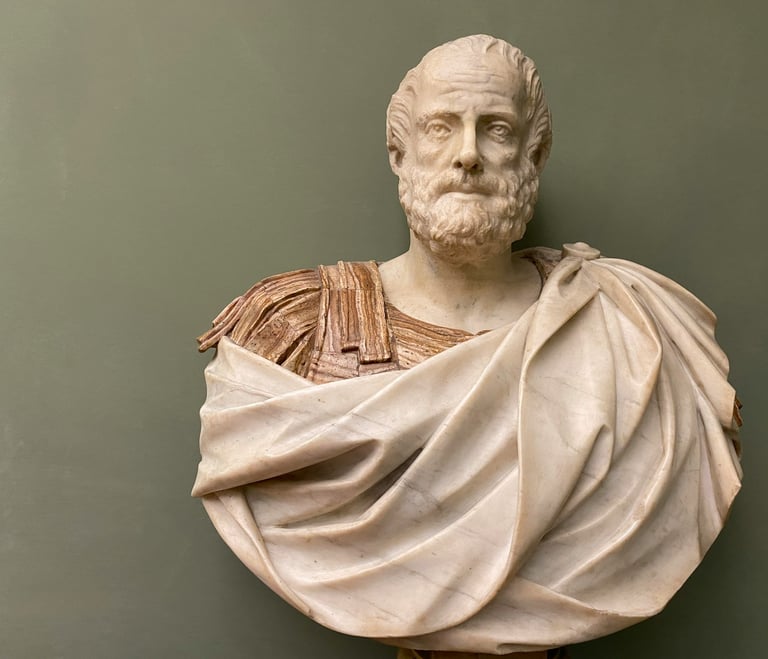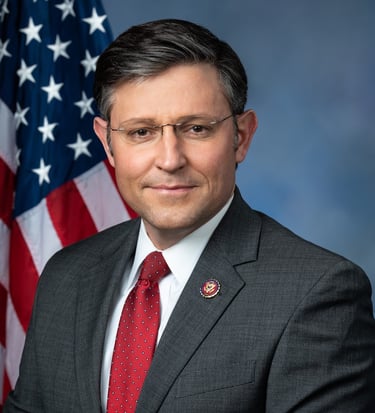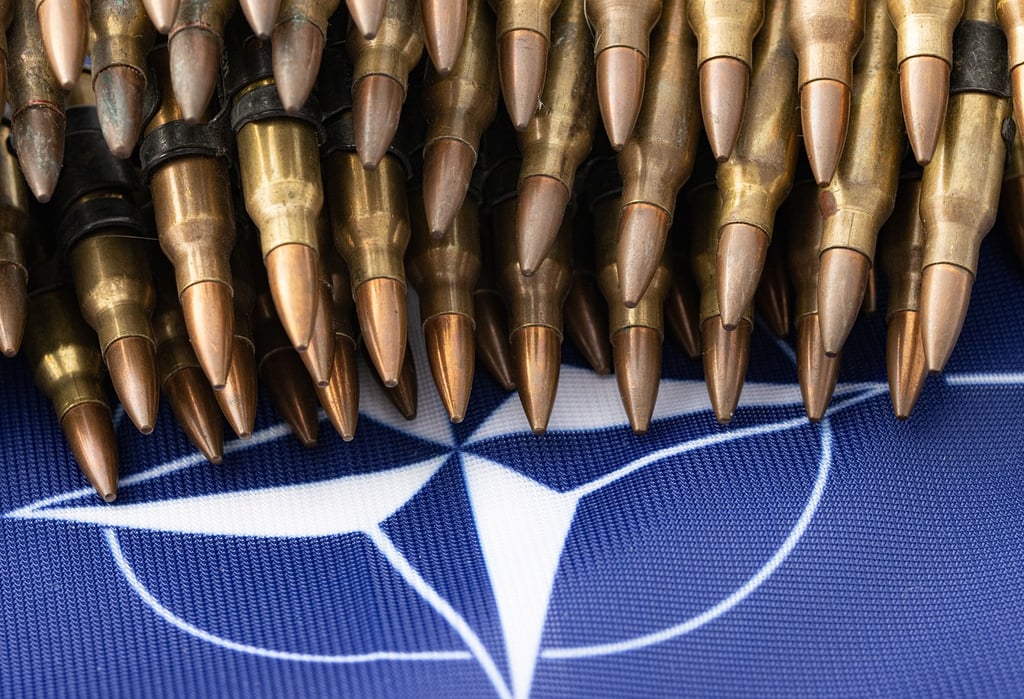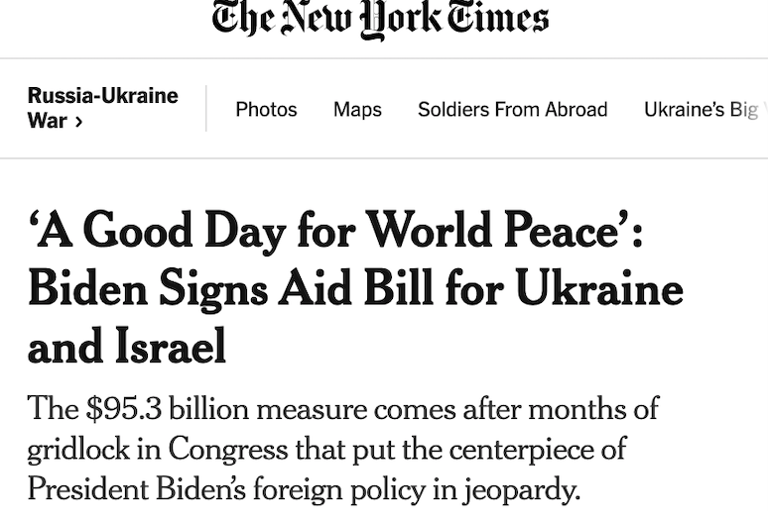Into the Abyss
Why are western politicians so ready to escalate?
4/22/20245 мин чтение
Poking the bear
Last week, Congress finally approved a $95 billion foreign aid package.
$8 billion to counter Chinese interests in the Indo-Pacific region, including $3 billion towards submarine infrastructure and development, and an additional $1.9 billion to replenish U.S. weapons already provided to Taiwan.
$26 billion in support for Israel's war against Palestinians. Interestingly, $9 billion is to be spent on humanitarian aid for the victims of the war, although who will actually be appointed to distribute this aid, and to who will receive it, was not disclosed.
$61 billion for Ukraine and the replenishment of US weapons already supplied.
This all represents a significant investment from US taxpayers towards the bolstering of a hostile position against countries deemed by the House of Representatives to be enemies.
Or, as Speaker of the House Mike Johnson described them on April 17th, "an axis of evil".
Ukraine are obviously the biggest winner of the package, or at least, those Ukrainians who are insulated from the direct violence of the conflict. President Volodymyr Zelensky was quick to show his gratitude via a post on X and assure America that their money would be well spent.
As murmurs of uncontrolled misspending and blatant corruption are kept well out of the mainstream press, the state department have justified fuelling the conflict in two ways:
1. By pointing out that most of this money is spent in the US, providing jobs and stability.
2. By describing the expenditure as necessary to preserve the security of Europe from Russian aggression.
The trouble with the first justification, is that the money effectively flows directly from the taxpayer to private companies such as Lockheed, Northrop Grumman, General Dynamics and Raytheon (now a part of United Technologies).
While the revenue undoubtedly means job security for employees of these companies, significant spending in the private sector contributes to both wealth disparity and inflation. What this means is exactly what the leadership aren't telling you - there is no overall economic benefit for the population.
Money used on consumable products, especially those used overseas, is simply not the same as spending on infrastructure such as roads, hospitals, education or healthcare.
Who actually benefits from the war in Ukraine?
The clearest winners of the war are hidden in plain sight. 2023 foreign arms sales from US manufacturers topped $238 billion, a new record and a 16% increase from 2022. These figures were released in January by the US State Dept, who described the results as "outstanding".
The other beneficiaries of the war in Ukraine are less quantifiable.
Many experts have pointed to the People's Republic of China as the nation who will ultimately benefit the most from the conflict.
China has emerged as a true global superpower, capable of challenging US global hegemony both militarily and economically. In fact, it is the USA's only true peer competitor, leading the US in many fields including manufacturing and AI technologies.
The conflict costs China nothing. They are apparently now closer than ever with Russia, one of the world's most resource-abundant nations, and have been able to agree on lucrative trade deals. If Mike Johnson's description of President Xi hasn't convinced them of US animosity, the military aid package to Taiwan certainly will.


Lucius Cassius, known as the wisest of roman judges was famed for asking
"Cui Bono?"


"I believe Xi [Jinping] and Putin and Iran are an axis of evil. I think they are in coordination on this"
Mike Johnson
Speaker of the House who also believes that the Earth is 6000 years old


Mankind must put an end to war before war puts an end to mankind - JFK
Opinion
The elected officials of the House seemed highly enthusiastic at the prospect of military spending, even if it means galvanising the supposed enemies of civilisation. It's almost as if they seemed quite oblivious to the long term effects of what will almost certainly be viewed by China as an antagonistic position.
Antony Blinken flies to Shanghai this week, presumably in an attempt to make sure that feelings aren't hurt but possibly to discuss the impending sanctions on Chinese banks (as reported by the Wall Street Journal) for daring to work with the Russians.
Washington must think the Chinese government are stupid.
A January 2024 poll commissioned by the European Council of Foreign Affairs (ECFR) found that only 10% of European citizens thought Ukraine could achieve victory through military means.
Kremlin spokesman Dmitry Peskov said that the new US foreign aid bill would only "further ruin Ukraine and result in the deaths of even more Ukrainians". President Vladimir Putin has repeatedly warned of the dangers of escalating the conflict, pointing out the consequences of war between nuclear powers.
If the cause of the war a cascade of diplomatic failures, is it these same failures that keep it going, or is the truth something more nefarious?
NATO expansion is a multi-billion dollar business. Any country wishing to join the organisation must purchase arms packages directly from US arms manufacturers. The Cold War officially came to a close in 1991, but huge sales opportunities appeared in the form of western Europe's newly independent countries.
Now, a little over three decades later, the result of this has come to a head.




Ukraine is a country in Europe. It exists next to another country called russia... russia decided to invade a smaller country so basically That's Wrong
- US VP Kamala harris
The trouble with the second justification is that nobody really believes it.
The Biden administration makes no admission of provocation on their side, but their activities in Ukraine have been well documented.
The causes of the war are debated primarily between western politicians and academics. Washington has repeatedly cited 'Russian aggression' painting President Putin as a ruthless megalomaniac. The truth is, like always, that Russia invaded Ukraine as a result of diplomatic failures from all parties involved.
Many highly respected academics and political analysts have repeatedly cited the expansion of NATO as the leading cause of an entirely preventable invasion.
Professor Glenn Diesen in his book, The Ukraine War & the Eurasian World Order, describes how US think tanks polled the support amongst Ukrainians for joining NATO. In early 2014, the result was 20%.
Ukrainians have been used. Although most of the world supports Ukraine's resistance, the solution needs to be found at the conference table rather than in the crucible of the battlefield.
Still, the administration have decided to double-down and continue to favour escalation.
Some have suggested that the purpose of this is merely to prevent Ukraine from falling before the November election. If there's any truth in this statement, it would mean that we are seeing an effort to spend billions of dollars, certainly costing more lives on both sides of the Dnieper and further ruin the East/ West relationship, all for the sake of holding onto power. .


